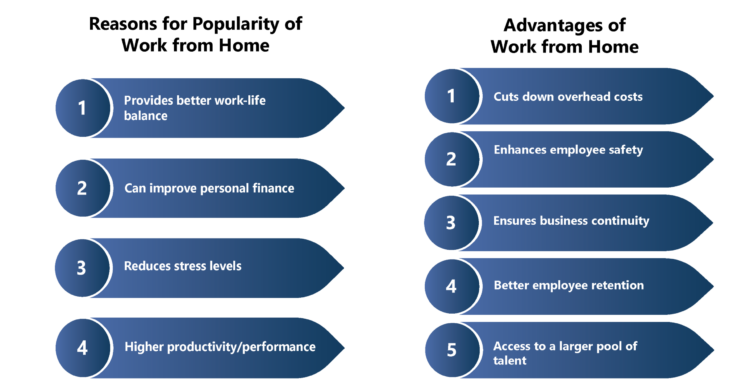Embrace the future of work – why remote and hybrid models are becoming the new normal in the post-COVID era, reshaping flexibility, productivity, and workplace culture.
1. Work from home benefits employees: It provides a better work-life balance, reduces commuting stress, improves personal finances, and enhances productivity and performance.
2. Advantages for employers: Organizations save on overhead costs, ensure employee safety, maintain business continuity, enhance employee retention, and access a larger talent pool.
3. Increased popularity post-COVID: Both employees and employers recognize the long-term benefits, making work from home likely to continue as a new normal even after the pandemic.
4. Addressing productivity concerns: Organizations need structured approaches, including providing infrastructure, digital tools, and training for supervisors, to manage remote teams effectively and maintain productivity.
Working from home is likely to continue for a long time after COVID for a significant share of the workforce. Many experts think ‘Work from Home’ might be the new normal post-COVID.

Organizations implemented the work-from-home concept long before the advent of COVID-19, albeit on a relatively small scale, usually to meet employees’ temporary personal needs.
However, with COVID-19, businesses were forced to make work from home the mainstay of their business continuity plans.

Neither employers nor employees had any choice in this matter if they had to keep the businesses running.
However, work from home is unlikely to end even after the pandemic is under control.
We see it still being popular with the employees going forward for the following reasons:

Working from home enables employees to schedule tasks flexibly, helping them balance their responsibilities effectively.
They can start work early or late, or work flexibly to balance time with family and other activities.
Additionally, the time saved on commuting can be used for personal or work purposes.
Employees may even relocate to their hometowns to be close to their families.

Working from home can help employees save money on commuting costs (if not sponsored by the company), on eating outside while at work (if not sponsored by the company), or on staying close to the office (where rents might be higher).
Some of them might operate from their hometowns where the savings might be substantial.

Work-from-home employees are less likely to feel the stress of commuting and of being away from their loved ones especially if someone at home needs care.

Employees can save a significant amount of time every day that would have been spent normally commuting. This can make them more productive.
They can also use this time to learn and develop, honing the professional skills needed for career growth.
Balancing between professional and personal responsibilities reduces stress and improves productivity.
Overall, working from home may lead to improved employee performance and faster career progression.
Despite its advantages, many organizations were initially skeptical about allowing employees to work from home before the COVID-19 pandemic.
The COVID pandemic was a rude wake-up call for many such organizations.
Having tested the concept, many organizations may consider continuing with work-from-home arrangements even after the crisis subsides.

They have seen work-from-home in action for several months and understood its benefits and risks.
Corporations such as TCS and Infosys have already announced plans to allow employees to continue working from home even after the pandemic.
Organizations see several advantages of ‘Work from Home.’ The key ones are as follows:

It reduces the need for organizations to invest in or maintain physical workplace infrastructure and facilities.
They can considerably reduce energy costs and save on other expenses, such as transportation, canteen, and housekeeping.
Moreover, organizations must offer a range of employee benefits in a dedicated workplace.
Even if organizations provide allowances to ‘work from home’ employees for high-speed internet and power backup at home, they can still save significantly.

Even if the current COVID-19 pandemic crisis subsides, social distancing norms may remain in place for much longer. It might become the new normal.
Hence working from home will enable organizations to implement social distancing norms quite easily and ensure employee health and safety.
Additionally, commuting during rush hours carries ahigh risk of road accidents, crime, and pollution. Therefore, working from home improves employees’ health and safety.

Although the COVID-19 crisis was a one-off, cities regularly experience various natural and artificial disasters, including heavy rain and floods, smog and bushfires, as well as protests and riots.
Working from home’ can become an integral part of the business continuity plans of most organizations.

It reduces the risk of losing top performers if they are unable to visit the workplace daily due to health or family reasons.
By enabling remote working for them, organizations enable them to take care of their personal needs and responsibilities without leaving.
This also deepens their sense of belonging and loyalty to the organization. As a result, such employees are likely to be more committed, dedicated, and loyal to the organization.

One significant benefit of remote working is that it provides organizations with a broader pool of talent from which to hire.
From freelancers to professionals who cannot follow a typical 9-to-5 work schedule, or even new mothers who need to take care of young children.
Organizations can pick from a much larger pool of professionals with the right expertise and experience.
There are distinct and quantifiable advantages of remote working for the employees as well as for the organizations.
However, organizations are still concerned about their impact on employee and team productivity.
Organizations need to address these concerns in a planned, structured manner to effectively consider large-scale work-from-home arrangements.
These measures would include providing the necessary infrastructure at home, digital tools, technical support, and proper training for supervisors to manage remote teams.
Implemented in the right way, work from home has the potential to become one of the biggest wins for organizations and integral to their business strategies.
Read about how to implement Work from Home effectively.

Lead author: Sagar Chaudhuri, the Co-Founder and CEO of HiFives. He is an HR Tech Evangelist with over 25 years of experience in both corporate and entrepreneurial settings. Previously, Sagar has held leadership roles at companies includingGenpact, Infosys, and ICICI Bank. He has an engineering degree from IIT Kharagpur and an MBA from IIM Lucknow. Connect on LinkedIn
To stay updated on the latest HiFives blogs, follow us on Twitter (@MyHiFives)